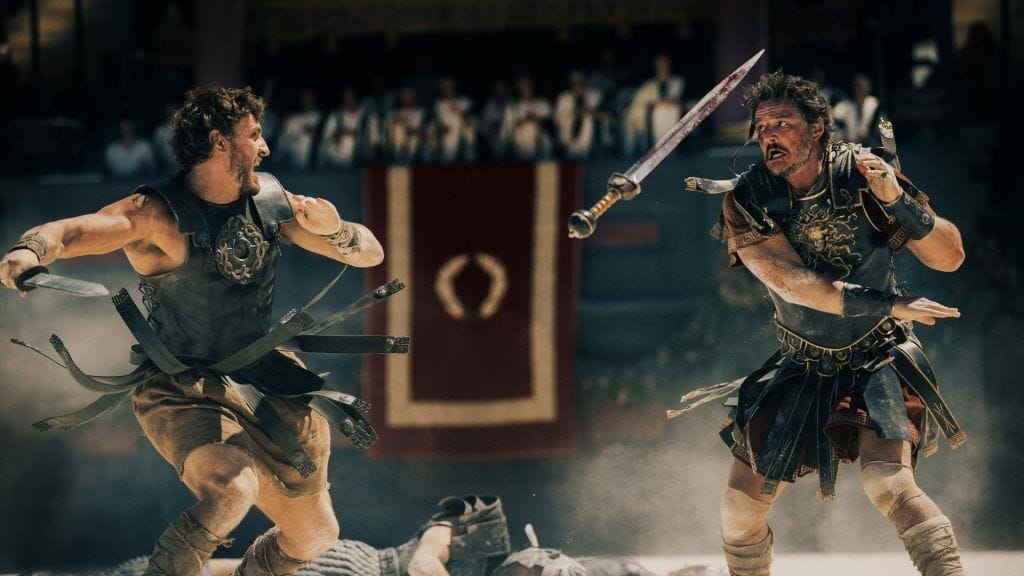Make Gladiating Great Again
Gladiator II and Hollywood's fascist drift

Gladiator II and Hollywood's fascist drift
I really liked Ridley Scott's last film Napoleon (2023), a historical epic that was hated by audiences and critics alike for its absolute rejection of epicness. In the film, Joaquin Phoenix played M. Bonaparte as a petty, perverted, mean-spirited and stupid little man, through whom history moved indelibly anyway. A better film-critical apparatus might have disdained this as an overly obvious nod to Trump, but so impoverished is the rubber-stamping poster-quote-writing industry that even making this connection at all occurred to only a few thoughtful writers.
While Pheonix took mannerisms and inspiration from Trump, Napoleon was more than just a jab at the present; it was a satisfying critique of our cultural relationship to historicity and to historical fiction. Critics hated how ignorant, weird and frustrating the characters were. It didn't feel sufficiently respectful.
But why should it? Napoleon was a counterrevolutionary who destroyed whatever scraps of progressive state reform remained from the French Revolution, responsible for the deaths of millions in senseless pursuit of his own vainglory. Napoleon also spread the worst aspects of that revolution, the bourgeois nation-state, across Europe. With great violence and speed, Napoleon accelerated the cause and drew the contours of nationalism that would result in such a cataclysm in the 20th century that people would look back on the apocalyptic Napoleonic Wars as somehow quaint or noble.
And so Napoleon, a film shot with the epic visual grandeur and exquisite attention to detail of a major budget Hollywood period piece, a lovingly constructed historical epic that deflates the man like a wet fart is exactly the kind of iconoclastic anti-militarist anti-fascist historical lens we need more of. Also it was funny as hell.
On the same political grounds Ridley Scott's Gladiator (2000) is one of the worst historical films ever made. To call the film fast and loose with the facts is to be unfair to the concept of fast and loose, but that's easily enough overlooked if a movie is fun. But Gladiator is anything but. It is extremely self-serious, a grim-dark portrayal of an aristocratic general– Maximus, played by Russel Crowe– unjustly stripped of glory by jealous and scheming politicians and thrown into slavery, and forced to fight to the death for the entertainment of his political enemies. But through sheer grit, physical strength and honor he battles his way with extreme brutality to the point of overturning an entire regime in glorious suicidal single combat.
Rather than insist on the humor or even just everyday reality of history, Gladiator leaned into the ancient world as a sort of unknowably mythical and epic age of heroic deeds and pure strength. The film (and its Best Picture win) set the table for white-nationalist myths of the ancient world like 300, Passion of the Christ and Noah, which in 2014 I wrote about as indicating a proto-fascist political turn in American pop-culture. It's almost shocking to note that Gladiator was released before 9/11, seeing as its anti-historical imperlialist machismo is of such a piece with the neocons of the Bush administration.
The absolutely unnecessary no-one-wants-this legacy requel Gladiator II, in theaters now, is being released long after the real world results of these politics have become known. Social media is full of accounts with roman statue avatars and usernames like CivilizationDefender88 and TradCultureMan posting about how we need to Retvrn to a time of heroes by voting for Trump and not masturbating for the entire month of November.
As a result of this context, Gladiator II is, at first, seemingly uneasy with the "ra-ra let's restore the Roman empire to glory" of its predecessor. Our hero, Hanno (Paul Mescal) and his wife Arishat (Yuval Gonen) are defending their home against the Roman fleet from the walls of Numidia, the "last free city" of the African Mediterranean. Numidia is conquered (in a satisfyingly massive set piece battle), Arishat slain and Hanno taken into slavery by the victorious Roman army, led by General Acacius (Pedro Pascal).
To the newly enslaved Numidians trapped in the galley of their warships, the Romans are brutal, cruel imperialists who have come to senselessly dominate the whole world. But when we see General Acacius return to Rome, it is revealed that he does not want to be celebrated as a conquering hero, he is tired of war, tired of fighting in the name of the corrupt twin-emperors, Geta and Caracalla. Geta and Caracalla are instantly recognizable as the pampered, made-up, faggoty decadents who represent "the real rot" in the heart of Rome. This cliche about decadence– which is to say, queerness– at the top bringing down Greece and Rome is one of the most beloved and central myths of conservative historiography and right wing Hollywood revisionism.
While that is going on at the palace, our protagonist Hanno is proving a great fighter in the outskirts, battling CGI baboons in the gladiator minor leagues, and he is purchased by scheming bisexual merchant Macrinus (Denzel Washington) to fight on the main stage, in the Collisseum. In exchange for agreeing to fight, Macrinus promises Hanno freedom and the chance to avenge Numidia by taking the head of General Acacius.
Hanno vows revenge, and he also talks about restoring the American...err...Roman dream (they literally call it the "Dream of Rome", like, a bajillion times, just in case you don't get it), which he is going to do by...he sort of mumbles something about restoring a Republic underneath the senate or something...and Geta and Caracalla are absolutely dripping in gold furnishings and aesthetics so you get the Trump comparison right because they're violent tyrants you get it right right?
But lest we think things are getting political in a too critical direction, didn't we just find out General Acacius is so sad about doing the imperialism that he wants to overthrow the emperors rather than do any more? And hey, where does Hanno really come from anyway? Is he maybe, secretly, oh, I dont know, somehow related to general Maximus, aka the world's most legendary bad-ass gladiator from 2000's hit film Gladiator, as portrayed by Russel Crowe? Or perhaps the murdered emperor Marcus Aurelius?
It doesn't take long before the film returns to being a basic restoration fantasy– Hanno isn't an African, he has been a Roman noble all along, Macrinus is a corrupt and power-hungry commoner, Acacius a noble warrior forced to follow orders he didn't like but protecting in his heart a dream of a more honorable lost Rome, you know, Make Rome Great Again by returning it to the proper bloodlines and all that.
Is this a failure of imagination or simply the nature of the current era of franchise cinema? Yes.
The franchise-building genre imperative to remake the original as worshipfully as possible means that, ultimately, the political gesture at critiquing Rome can only ever be eclipsed by glorious single combat for the future of the entire empire. Where the iconoclastic impulse of Napoleon was genuinely fresh and fun, this movie must show respect to its predecessor, Gladiator, and is dripping with nostalgia and reverence for the first film. This is as much a financial reality of the requel genre as anything, you have to establish the emotional and film-historical importance of whatever piece of shit movie you're remaking, you have to pretend it was a piece of art in need of revisiting, cant let on that its all a big scam.
So before it even gets to have its own relationship to the historical content it depicts, Gladiator II will talk in such absurdly heightened tones about the first film (there is literally a huge monument to Maximus in the enslaved gladiator training grounds for some reason) that it would be at the very least discordant to take a different emotional tack for the rest. Gladiator II doenst try. It is so goddamn self-serious and grim that even absolute fountains of charisma like Peter Mensah and Pedro Pascal are subdued and downcast.
The big bright spot here is Denzel Washington. Gleefully reprising his role as Mackers from The Tragedy of Macbeth (2021), he is having so much fun that he more or less carries the film on his back. Where he played Billy Shakes' Scottish King almost naturalistically, here he plays the similarly violent power-hungry Macrinus with huge, campy pomp, swishing around in gilded robes and chewing on the film's flimsy dialogue with flourishes and pauses as though it were written in Iambic Pentameter. It is a crime that a scene of him making out with another man ended up on the cutting room floor.
Much more fucked up is the disappearance of May Calamawy, an Egyptian-Palestinian actress who was announced and credited as having a lead role during production and promotion, but has been reduced to an unspeaking extra in the background of a few scenes. Couldn't have anything to do with her public solidarity with Palestine, could it? Don't answer that, you might not get to star in a movie either.
But in these ways Gladiator II is an almost perfect example of how the material necessities of film marketing and production determine a film's imagery and meaning. We know that Ridley Scott can do a very different kind of historical film– not just Napoleon but House of Gucchi and The Last Duel (both 2021) feature different affective registers shot through the genre of the "bio-pic" "historical epic".
But when it comes to representing recent cinematic history, as is done through a senseless reboot like Gladiator II, arriving a quarter century after the perfectly narratively contained and basically un-sequel-able first film (almost no actors or characters return, since everyone from the first is basically dead by the end of its runtime), the only available affect and aesthetic is nostalgia, yearning, a desire for RetVrn. The ascendancy of franchises, IP worlds and extended universes has represented a massive far-right victory over cinematic and televisual culture. And no one and nothing in the world of Hollywood cinema is immune from its miserable flattening of meaning and desires, nevermind a working mainstream director like Scott.
Still, the battle set pieces are way more fun in this one, and it manages to glide right through its obscenely bloated 2 and a half hours. I'd watch Gladiator II over Gladiator every time.





